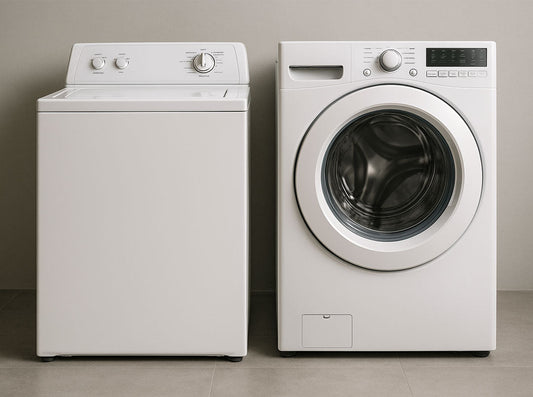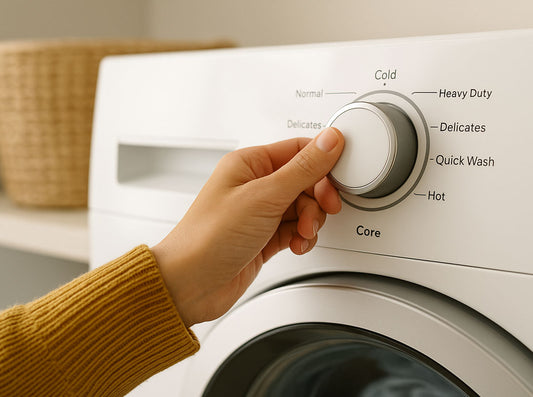Americans like doing laundry—according to The American Cleaning Institute, it's the nation's favorite cleaning task. There are few chores as satisfying, it seems, as the transformation of a basket of dirty clothes into a load of fresh, clean laundry. There are also a few things as frustrating as laundry mishaps—be it that errant red sock in a load of whites or a forgotten tissue in someone's pocket that covers the washer in faux snow.
The good news is that fabrics, washing machines, and detergents have all evolved, making it possible to clean better with less. Consumer Reports, for instance, found most people use twice the amount of laundry detergent necessary, which can damage clothes and appliances, as well as the planet in terms of waste.
Learning how to do laundry right rather than just tossing clothes and linens as an unruly bunch into the machine and using the same settings for each load, not only ensures cleaner clothes, towels, and sheets—it also can extend the life of your garments and has serious environmental impact.
HeySunday got the nitty-gritty answers to some of the most common laundry-related questions with the help of experts like Easter and other sources like the Good Housekeeping Institute Cleaning Lab and Martha Stewart. The questions included were inspired by independent research along with common Google search queries related to laundry.
"The most common mistake made today—and it's promoted widely on the internet—is that you don't have to sort clothes and can just put everything in because we have better detergents and better machines," said Dr. Elizabeth Easter, a professor of Textile Science who established the Textile Testing Laboratory at the University of Kentucky. According to Easter, loads need to be sorted based on both color and fabric type, so that synthetic fibers can be treated differently from natural fabrics like cotton. Plus, she recommends fastening all zippers and hooks as well as turning clothes inside out before they go in the washing machine. According to Easter, all that washing is rough on clothes and the brunt of it should be taken up by the inner part of clothes.
If that seems like too much work, consider this: How bad did you feel the last time you damaged a beloved item of clothing due to a laundry mistake? That torn rayon shirt? The shrunken wool sweater? These tragedies are avoidable, but you've got to know some stuff.

What does 'dry clean only' really mean?
One key to laundry, it turns out, is actually reading those labels on garments and linens and then adjusting the different settings on the washing machine and dryer accordingly. The good news is according to a 2019 ACI National Cleaning Survey, more than 7 out of 10 people frequently do read the tags before washing their clothes. If you need help understanding the symbols, here's a handy guide by Reader's Digest.
There's no interpretation necessary when a label reads "dry clean only" though—it truly means dry clean only. There's no wiggle room around it when it's the only instruction given on the tag because either the product or the lining will be harmed in a traditional washing machine. Fabrics like lace, leather, and velvet often require dry cleaning, as do suits and tailored jackets, which can easily lose their shape.
"Manufacturers, in general, are making less dry-clean-only fabrics due to customer demand because it was such a turn-off for people," said Easter, who also attributes the rise of casual attire at work to why we see less "dry clean only" labels than we used to—modern workwear like khaki pants, T-shirts, and hoodie sweatshirts can all be washed at home.

What kinds of fabrics shouldn't go in the dryer?
"The care label will recommend what items should not go into a tumble dryer and will recommend hang to dry or lay flat—the most common product you will see with that label is wool," said Easter. Wool, she explains, comes in many kinds (cashmere, sheep, angora) and will shrink in the dryer. So will rayon, check the tag to see if it's okay to dry at a very low temperature or not.
In general, lace, leather, silk, rubber-backed bath mats, and anything made with spandex (workout clothes, underwear, bras), or wool can't handle the heat and should be air-dried to prevent damage.
Another rule of thumb is if Taylor Swift wears it in concert, it probably can't go in the dryer, so that's anything with sequins or faux fur. Other no-no items are tights or pantyhose and swimsuits, which should also be washed only on delicate (and maybe even in a mesh bag) or by hand. Underwear with elastic fares far better from air drying as well, and bras almost always belong on a drying towel or rack.
As tempting as it is to throw a pair of sneakers in the dryer, Nike advises not to do it—the agitation will damage hardware like zippers and could deform your shoes.

TOUGH ON STAINS, GENTLE ON SKIN
Laundry detergent sheets with incredible cleaning power and none of the mess and bulk of traditional liquid detergent.
What is laundry stripping?
There are many dramatic videos online of "laundry stripping," a method of deep cleaning where people soak their laundry in a variety of cleaning agents in the bathtub overnight, or for another long duration of time. The idea is to remove residue and build-up of chemicals, hard water, or body soils.
While the process may seem appealing, Carolyn Forté, executive director of the Good Housekeeping Institute Cleaning Lab, cautions that the process could actually cause the colors in fabrics to run. For Easter, laundry stripping is unnecessary: "If you follow the advice on the label and do it correctly, you should not have any need to do laundry stripping."
How do you get grease stains out?
Stains pose the biggest problem in doing laundry—discolorations like those awful half-moons of sweat on shirtsleeves or say, ketchup splatters on a T-shirt that make us feel like Lady Macbeth, shouting to ourselves about imperishable spots. Without proper know-how, dripping salad dressing down a new pair of trousers feels a lot like a death sentence for fabric. Pre-treating is key, but as Easter points out, it isn't always possible. "It's very difficult to do with kids and families and work," she said.
Instead, Easter suggests correctly treating the stain by type. Protein stains are human or animal-based, like milk, eggs, dairy, blood, or other body fluids. These should be pre-treated or pre-washed with cold water "because hot water will set the stain." Then, wash the item in cold water. On the other hand, oil-based stains—from cosmetics, cooking fats, salad dressings, and good old-fashioned grease, need spot treatment with a hot water wash. Don't dry anything until the stains are gone.
How often should you wash your jeans?
Denim is perhaps the most controversial subject in laundry—how often to wash jeans and how best to do it has inspired great debate among denim aficionados. From folks who wash and dry their jeans daily to those who opt to stick them in the freezer for cleaning, rather than risking the agitation of a machine, there's a wide range of care options.
"Everybody is wearing jeans to work now and you go sit in an office. Well, there's no reason to wash them every day," said Easter. Most experts like Levi Strauss CEO Charles Bergh and Patric Richardson, host of "The Laundry Guy" on Discovery+, agree that washing jeans as little as possible is the way to go—that way they stay dark. Whether it's by hand in the sink or in a machine, turning them inside out before washing helps protect the fibers, which is a good rule to follow not just with jeans but for all clothes.
"Getting people to turn clothes inside out is a difficult job because that means you've got to turn them right side out while putting them up or folding them," said Easter. "It's one more effort but it will help extend the life of a product as well as the appearance of the item more than anything else that you can do."
ECO FRIENDLY LAUNDRY SHEETS
A simple switch to laundry detergent sheets = a BIG impact! Reduce laundry waste. Reduce plastic waste. Protect our planet.
Story editing by Carren Jao. Copy editing by Robert Wickwire. Photo selection by Lacy Kerrick.









